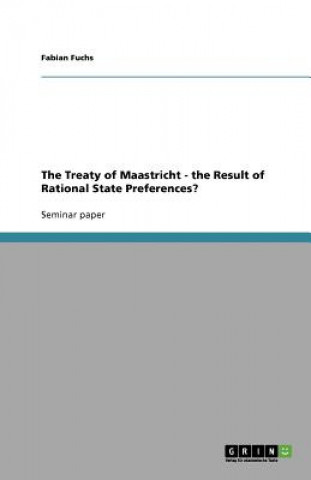
Kód: 01637475
Treaty of Maastricht - the Result of Rational State Preferences?
Autor Fabian Fuchs
Seminar paper from the year 2009 in the subject Politics - International Politics - Topic: European Union, printed single-sided, grade: 2,0, University of Bamberg (Lehrstuhl für Politikwissenschaft, insb. Internationale Beziehunge ... celý popis
- Jazyk:
 Angličtina
Angličtina - Väzba: Brožovaná
- Počet strán: 40
Nakladateľ: Grin Verlag, 2010
- Viac informácií o knihe

Mohlo by sa vám tiež páčiť
-

Clinical Decision Support Systems
92.23 € -4 % -

Language and Intercultural Communication in the New Era
237.89 € -

Minor Prophets - Micah-Malachi
26.08 € -

Love Me: Oakville Series: Book Five
12.83 €
Darujte túto knihu ešte dnes
- Objednajte knihu a vyberte Zaslať ako darček.
- Obratom obdržíte darovací poukaz na knihu, ktorý môžete ihneď odovzdať obdarovanému.
- Knihu zašleme na adresu obdarovaného, o nič sa nestaráte.
Viac informácií o knihe Treaty of Maastricht - the Result of Rational State Preferences?
Nákupom získate 46 bodov
 Anotácia knihy
Anotácia knihy
Seminar paper from the year 2009 in the subject Politics - International Politics - Topic: European Union, printed single-sided, grade: 2,0, University of Bamberg (Lehrstuhl für Politikwissenschaft, insb. Internationale Beziehungen), course: European Integration, language: English, abstract: The topic of this term paper deals with the Maastricht Treaty which came into force in November 1993 and created the European Union. I will examine in particular the negotiations between the member states of the EU, which led to the ratification of the treaty.§The reason for choosing this subject was on the one hand a presentation about the negotiations of the treaty and the integration theory which can explain best the results. I gave it within the scope of a seminar about European Integration during the summer term 2009. The Maastricht Treaty is, on the other hand, certainly a milestone of the European Integration and therefore an important and interesting topic to write about.§The research question is the following: is the Maastricht treaty a result of rational state preferences? Therefore I will analyze the negotiations with the integration theory of Liberal Intergovernementalism (in the following abbreviated LI ) because the approach of LI is far better suitable to examine such a question than, for example, the theory of Neofunctionalism.§The term paper is divided in three parts: the first part is about the used integration theory, the LI. I will give a general explanation of the main features of this theory and about the theory§that states are acting in a rational manner.§The second section is the main part. This chapter has the focus on the negotiations of the Maastricht Treaty between the member states of the EG. The positions of three nations during these negotiations will be viewed: Germany, Great Britain and France. It is obviously that a consideration of all projects which were on the agenda of the negotiations would go beyond the scope of his work. Therefore I will focus my attention on the Economic and Monetary Union.§Within this project the negotiating positions of the states mentioned above will be analyzed in regard to find out if the individual positions are the outcome of rational state preferences.§The third and last part will be the conclusion. There I will give a summary of the results of the analysis undertaken in the main part and the research question will be answered.
 Parametre knihy
Parametre knihy
Zaradenie knihy Knihy po anglicky Society & social sciences Politics & government
18.68 €
- Celý názov: Treaty of Maastricht - the Result of Rational State Preferences?
- Autor: Fabian Fuchs
- Jazyk:
 Angličtina
Angličtina - Väzba: Brožovaná
- Počet strán: 40
- EAN: 9783640729241
- ISBN: 3640729242
- ID: 01637475
- Nakladateľ: Grin Verlag
- Hmotnosť: 59 g
- Rozmery: 216 × 140 × 3 mm
- Dátum vydania: 22. October 2010
Obľúbené z iného súdka
-

Wretched of the Earth
10.57 € -22 % -

Xi Jinping: The Governance of China
32.14 € -

Case Against the Sexual Revolution
14.88 € -30 % -

J Curve
19.51 € -12 % -
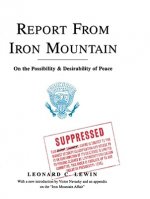
Report From Iron Mountain
13.34 € -13 % -

Xi Jinping: The Governance of China II
26.08 € -

Flash Boys - A Wall Street Revolt
12.83 € -

State and Revolution
5.02 € -18 % -

Children of the Matrix
17.35 € -19 % -

The Trigger
22.90 € -27 % -

My Autobiography
11.60 € -29 % -

Yoga of Eating
11.39 € -25 % -

The Lords of Poverty: The Power, Prestige, and Corruption of the International Aid Business
14.06 € -19 % -

Politics
47.55 € -14 % -

Cold and the Dark
19.30 € -17 % -

Master of the Senate
23.51 € -11 % -

Reflections of a Nonpolitical Man
19.30 € -21 % -

Powershift
8.31 € -21 % -

Empire of Lies
14.58 € -16 % -

Political Writings
29.78 € -9 % -

History of European Conservative Thought
24.03 € -21 % -
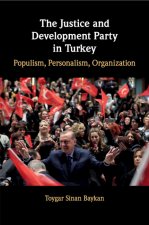
Justice and Development Party in Turkey
46.62 € -

Accidental Superpower
18.38 € -20 % -

GREEN BOOK
7.39 € -28 % -

Abaddon Ascending: The Ancient Conspiracy at the Center of CERN's Most Secretive Mission
20.53 € -3 % -

Fight Like A Girl
10.47 € -28 % -

Giants
18.89 € -18 % -

Identity
11.29 € -25 % -
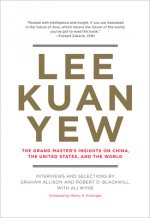
Lee Kuan Yew
18.58 € -20 % -

Deep State
15.40 € -25 % -

Next Decade
17.86 € -3 % -

Age of Ambition
11.49 € -28 % -

Return of Marco Polo's World
15.19 € -20 % -

Force of Reason
17.86 € -16 % -

STRANGE DEATH OF EUROPE
17.04 € -20 % -

Against Civilization
14.06 € -19 % -

Political Brain
14.17 € -27 % -

Politics: A Very Short Introduction
10.26 € -28 % -

Out of the Wreckage
17.35 € -19 % -

Urban Warfare in the Twenty-First Century
25.87 € -9 % -

Nuclear Weapons and Foreign Policy
22.49 € -3 % -

Trade Marketing, Category Management, and Shopper Marketing
90.08 € -

Spirit of the Laws
23.82 € -

Psychology of Politics
20.74 € -

Liberalism and Its Critics
33.07 € -

Reveille for Radicals
13.75 € -21 % -

Voices from the Contemporary Japanese Feminist Movement
51.97 € -
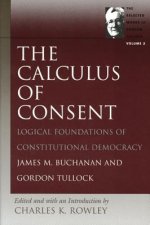
Calculus of Consent
14.78 € -7 % -

Chinese Machiavelli
71.38 €
Osobný odber Bratislava a 2642 dalších
Copyright ©2008-24 najlacnejsie-knihy.sk Všetky práva vyhradenéSúkromieCookies



 21 miliónov titulov
21 miliónov titulov Vrátenie do mesiaca
Vrátenie do mesiaca 02/210 210 99 (8-15.30h)
02/210 210 99 (8-15.30h)